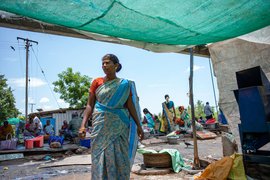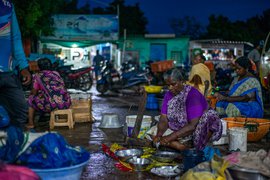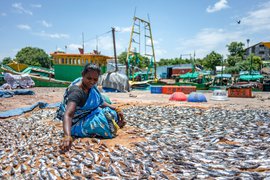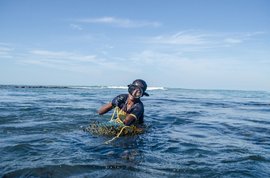“Only my family hesitated to accept me, not the fishermen. Boat owners look upon me as a kairasi [lucky hand],” says Maneesha, a trans woman fish auctioneer. “They did not reject me. They don’t care who I am. They just want me to sell their fish.”
The 37-year-old is one of around 30 women auctioneers working at the Cuddalore Old Town harbour. “I can get a higher price as I can do it loudly. Many want to buy fish from me,” she says, her voice rising above the other sellers as she calls out to buyers.
Maneesha has been a fish auctioneer and dry fish trader long before she underwent gender-affirming surgery. This livelihood requires her to interact every day with boat owners and fishermen. “They don’t have a problem. I auction fish better than others.”
She says that without the moral support of the
boat owners, she could not have undergone the surgery in 2012. Among them is
her close friend and confidant whom she married at a local temple soon after
the procedure.


Maneesha (right) is a fish auctioneer and dry fish trader. Seen here close to Cuddalore Old Town harbour (left) where she is one among 30 women doing this job


No one discriminates against her, says Maneesha, a trans woman who interacts every day with boat owners and fishermen: 'They don’t have a problem '
At the age of 17, Maneesha started working for a seller with a flourishing dry fish business, and after learning the craft, built up her own over the next decade. “Through this business, I made a lot of contacts. Some of them asked me to start auctioning instead of drying fish in the hot sun. Slowly I got into that job.”
In order to get the rights to auction fish, the auctioneers, almost 90 per cent of whom are women, must pay boat owners in advance. “I have been auctioning [fish] for four boats, all using ring-seine nets. I started by advancing them three-four lakh rupees each. I had some savings but also had to borrow from my friends,” says Maneesha. “I used the profits from both the dry fish business and auctioning to pay back the loans,” she adds.
Auctioneers like Maneesha get to work once the fish comes into the harbour, caught by large boats that use ring-seine nets ( surukuvalai or down-sized purse-seine nets); sometimes groups of smaller fibre-reinforced boats managed mainly by family units also bring in catch.
“If the fish was spoilt, I dried it for poultry
feed, otherwise I made edible dry fish,” she explains. Reinvesting her profits,
Maneesha saw her business grow substantially.


Auctioneers like Maneesha get to work once the fish comes into the harbour. Some fish need to be kept in a ice box to prevent them from getting spoilt while some are kept in the open (left)


Left: Maneesha waits with other women for the fish auction to begin. Right: All sellers leave the bridge around 5 p.m.
Things changed when five years ago the land on which Maneesha was drying fish was taken over for the construction of a boat-house in the upcoming port. Her business had survived earlier threats, including a petition by a few people claiming dirt and stench near their homes. Now with no space to conduct business and difficulties in securing fish, she shut it down.
*****
In 2020, the disruptions caused to transportation and supply chains by covid-19 meant fewer boats were going out and landing at the harbour. The ban on purse-seine nets in 2021, following an Amendment to the Tamil Nadu Marine Fisheries Regulation Rules, dealt the second blow. Read: Drying fish, dwindling fortunes
Maneesha had just invested in her husband’s steel boat in 2019. “Many people have given us loans to invest in these boats,” she says. “We have the boats, I have invested 20 lakhs each in four boats, but with the government ban, no one will purchase them from us. And when the boats don’t go out fishing, we don’t earn anything. So how can we repay the money?”
In January 2023, however, the Supreme Court
allowed purse-seine fishing beyond the territorial waters of Tamil Nadu, but
within the Exclusive Economic Zone with conditions. Due to fisher conflicts
around the ring-seine technology in Cuddalore, the boats for which Maneesha
auctions, are now forced to land in Puducherry. She now has a Rs. 25 lakh
outstanding loan still pending, despite selling off her jewellery (105
sovereigns) and mortgaging her three-room concrete house to the bank.


Maneesha in front of the house (left) she built with her earnings. She also keeps cows (right), goats and chickens to supplement her income from selling fish
All her investment is from private loans, despite the fact there are 20 Self Help Groups (SHG) in the Cuddalore Old Town ward and she is prepared to give them all the necessary documents. “They all refuse to accept me,” she says. “No bank has given me a loan because I am transgender; they don’t trust me.”
She feels that bank credit and some government support would have helped. “The government gave around 70 transgender people one-room houses in Thirumanikuzhi, but in the midst of a forest, with no water or transport facility. Who would go there? The houses were tiny and isolated, nobody would know if someone killed us; no one would even hear us scream. We returned the house pattas to the government.”
*****
Assigned male at birth, the youngest of five siblings, Maneesha started earning at the age of 15. Her father was a Customs Officer, originally from Pillaichavadi village near Puducherry, but was posted at Cuddalore Old Town harbour. Her mother was her father’s second wife. She belonged to a Scheduled Caste community and ran a tea shop close by.
Maneesha’s father’s first wife and children lived in his village. An alcoholic, he was never around and hardly gave any money for the second family’s upkeep here in Cuddalore. Maneesha’s eldest brother Soundararajan, now 50 years old, started fishing at the age of 15 to support his mother and siblings. She has three sisters, Shakuntala, 45, Shakeela, 43, and Anandhi, 40; Shakeela is a fish vendor, while the others are married and run their own homes.


Besides fish, Maneesha also sells milk (right)
All the siblings started working at the age of 15. Maneesha’s mother and sister sold snacks and tea at the harbour. Maneesha, being the youngest, would take up whatever work her mother wanted her to do. In 2002, when she was 16, she joined the Indian Technical Institute (ITI) in Cuddalore and completed a year-long course in welding. She also worked at a welding workshop for a month, but didn’t like it.
When she switched to working at a dry fish enterprise, she was earning Rs. 75 a day – head-loading the fish, cleaning, salting and drying it.
Having learnt the skills needed for running a dry fish business, around 2006, at 20 she started drying fish on her own on an open woodland plot that she cleared for the purpose. Debt piled up after the weddings of both her sisters. That is when Maneesha bought two cows and started selling their milk, alongside the fish business. Now, she has five cows, seven goats and 30 chickens, in addition to her job of auctioning and selling fish.*****
Although uncomfortable with her assigned gender from the age of 10, Maneesha started speaking about it only once she was earning as a teenager. She would buy jewellery and sarees for her mother and sisters, and keep some for herself. By the age of 20, she had decided to undergo gender-affirming surgery.


Maneesha with a friend (left) after work and outside her home (right)
She started mingling with other transgender people. One of her friends went to Mumbai to get her operation done. She lived there for 15 years before returning to Cuddalore. She offered to help but Maneesha didn’t want to leave her family to go to Mumbai.
Instead she went to a private hospital in Cuddalore where she had to furnish certificates from a psychiatrist and a lawyer, apart from having to convince the authorities about her reasons for wanting to undergo the procedure. She paid for the surgery with the money that she had secured from her businesses and supported herself through the process.
Through her transitioning years Maneesha’s relationship with her family was fraught. Her mother and sisters didn’t speak to her for several years after the surgery, though she lived right next door in the home she had constructed for herself. Her mother was deeply upset and even stopped eating well. She made sure to convey to Maneesha that she should never resort to asking for alms on the streets as she had seen some other transgender people do.
A few years ago, Maneesha’s mother was diagnosed with intestinal cancer. She paid Rs. 3 lakhs for her surgery and treatment, and it was only then that they reconciled. Her mother passed away a year later, but Maneesha’s care for her mother helped normalise her relationship with her siblings.
Maneesha insists that most transgender people are willing to work as hard as anyone else, and that lack of government support often leaves them vulnerable to abuse. “At times I am scared to open the door when I am alone in this house,” she says. “My sisters live separately, though close by. If I call them, they will come immediately.”




